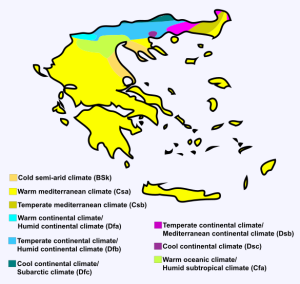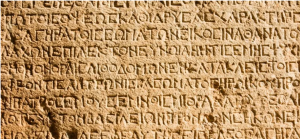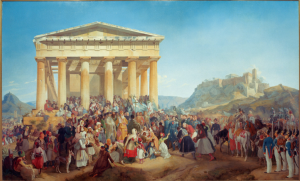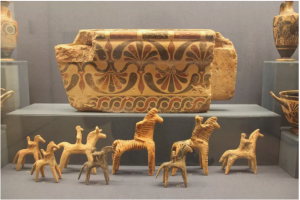Location

Southern Europe is where Greece is situated. Greece is surrounded by the Ionian Sea to the west, the Mediterranean Sea to the south, and the Aegean Sea to the east. The raw beauty of the Greek terrain stands out, but so do its variety and complexity (Tsilimigkas & Rempis, 2021). The sea, the highlands, and the plain are the three dominant components. The arms and passageways of the sea pierce the Greek mainland so deeply that only a little wedge-shaped area of the heartland is more than 50 miles from the shore. There are several island arcs and archipelagoes in the sea beyond the rugged limestone cliffs and peninsulas (Batsaris et al., 2019).
Population and size
Greece has a population of 10.4 million people as per the 2021 census. Greece is approximately 131,960 km² in size.
Language

The main language spoken in Greece is Greek spoken by around 99% of the population. The other languages are French, German and English.
Climate

Greece has dry and hot summers and a Mediterranean climate with moderate, rainy winters in the southern lowlands and island parts and cold, snowy winters in the north and central highlands. While lower in the north, the summertime average temperature in Athens and southern Greece is around 24°C (Eleftheriou et al., 2018). In general, the southern region of the nation has greater temperatures. From June through August, there are often bright and dry days with just occasional thunderstorms. A system of seasonal winds often provides relief from the hot, dry weather.
History

Bronze Age

The first habitation in Ancient Greece may be traced back to the Palaeolithic period, according to excavations. Greece gave rise to the magnificent stone and bronze civilizations of the Cycladic, Minoans and Mycenaeans throughout the second century BC. These were the first significant civilizations in both Greek and global history (Hall, 2018).
Classical Period
The classical era is well-known all around the globe.
The golden age of classical antiquity was the fifth century B.C. when Athens laid the groundwork for western civilisation. This ancient Greek city-state flourished in many areas of civilization, from philosophy and science to music and theater to a novel political system called democracy, and eventually became the greatest naval force of its time in Greece. It is not an exaggeration to claim that this age was pivotal in shaping the future of humanity (Powell, 2021).
The other ancient Greek cities were either allies of Athens or Sparta, the two most powerful cities in Greece. The combined forces of Greek city-states successfully repelled a Persian invasion in the fifth century. The next Peloponnesian War between Athens and Sparta, however, was the beginning of the end for the wonderful classical period. As a result of their successes, the northern Greek tribe known as the Macedonians eventually established their own kingdom and subsequently conquered and dominated all of the other Greek city-states (Worley, 2021).
Alexander, embarked on a massive voyage into Asia soon after his father’s death. Invading the Persian Empire in 334 BC, Alexander the Great’s army pushed all the way to India (Kallianiotis, 2022).
Roman period
The Roman conquest of Greece in 168 BC and afterwards marked the beginning of a new era for the country. During this time, Greek culture transitions into the Roman era. During this historical period, significant conflicts are fought throughout the nation and new towns, such as Nikopolis in western Greece, are founded. In spite of the fall of Athens and Greek culture as a whole, the Roman Empire adopted Greek as a second officially recognized language. The Romans revered the Olympian gods and studied the works of ancient thinkers. The once-mighty Roman Empire begins to fall apart in the third century AD, splitting into the western and eastern halves (Ralli, 2019).
Byzantine Period

The Eastern Roman Empire, centered in Constantinople, survived for another thousand years after the collapse of the Western Roman Empire at the hands of barbarian North European tribes.
At this time in history, the Christian faith is adopted as the imperial state religion, new lands are conquered, and new legal frameworks are established. These statutes eventually became the foundational legislation for the newly constituted of Modern Greek state in the nineteenth century (Mitchell & French, 2019).
Ottomans period and Independence war
In 1453 A.D., the Ottoman Turks captured Constantinople and, over time, the rest of Greece. At the time, the remainder of Greece was partially under the control of the Knights of Saint John and the Venetians (Özkan, 2021)
Inflicted by the Ottoman domination, the country often erupted in revolt. All of these revolts were so disorganized that the Ottoman army put a stop to them until the Greek War of Independence began in March 1821. This year marks a watershed moment in our nation’s history (Özkan, 2021).
The first independent Greek state was created in 1829, and Ioannis Kapodistrias, a Greek diplomat in the Russian service, was appointed ruler. This came after years of bloody conflict, killings, and seizures. The Peloponnese, the island of Sterea, and the Cyclades were all part of the first Greek state (Özkan, 2021).
Twentieth century
Greek monarchy began with Bavarian Prince Otto after the assassination of Kapodistrias in 1831, and continued with Danish King George I in 1863. After the British presented the Ionian Islands to the new monarch of Greece, they gave the region of Thessaly to the Greek state from the Ottoman Empire. After World War One, the Greek state annexed the regions of Macedonia, Crete, and the Eastern Aegean Islands (Kallianiotis, 2022).
It was at this period that Eleftherios Venizelos, Greece’s most well-known prime minister, emerged as a political force. A mass expulsion with Turkey in 1922 caused significant disruption for Greece, since it resulted in the relocation of many Greeks from Asia Minor to the mainland. Although settling into a new nation was challenging for refugees at first, they ultimately proved to be a boon to the economy and social progress of their adopted home. Although the Greek people put up significant resistance to Axis troops during World War II, the country was ultimately overrun by the Germans and the Italians. Dodecanese islands, which had been under Italian rule since the early 20th century, officially joined the Greek state after WWII. After that, for the next three decades, the country was under a military junta from 1967 to 1974. It has been a Parliamentary Republic in Greece since 1975 (Clogg, 2021).
Government and independence
On March 25th, 1821, Greece won its freedom from foreign rule. Beginning in the year 1453, Greece was an integral component of the Ottoman Empire. On March 25, 1821, Bishop Germanos of Patras flew the flag of revolution above the Monastery of Agia Lavra in the Peloponnese. This act was the spark that ignited the Greek insurrection. The revolutionary movement adopted the slogan “Freedom or death” as its guiding principle. The Greeks had early triumphs on the battlefield, notably the conquest of Athens in June 1822, but this was followed by a period of internecine conflict among their ranks. By the year 1827, the Turks had successfully retaken Athens along with the majority of the Greek islands (Özkan, 2021).
At the very moment when it seemed as if the revolution was on the approach of being defeated, Great Britain, France, and Russia became involved in the battle. The suffering of Greece had inspired widespread compassion throughout Europe, and a great number of influential thinkers had spoken on behalf of Greece, including the famous English poet Lord Byron. An Ottoman-Egyptian fleet was decimated at the naval Battle of Navarino, which was fought between the united forces of the United Kingdom, France, and Russia. The Treaty of Edirne, which was signed in 1829, put an end to the revolt and created an independent Greek state (Özkan, 2021).




